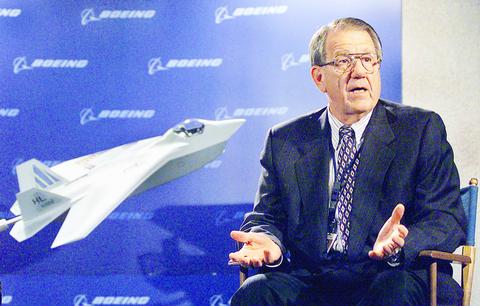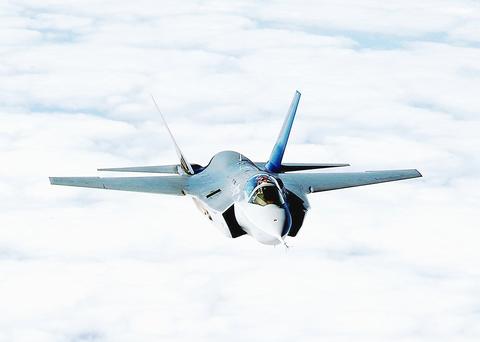Boeing Co's loss to Lockheed Martin Corp for the US$200 billion Joint Strike Fighter program is a short-term blow that won't hurt its ability to remain a competitive military aircraft supplier, analysts said.
Boeing, already suffering from declining airliner deliveries after the Sept. 11 terrorist attacks, said it cut its forecast for next year's sales by US$1 billion to US$55 billion. The company left its guidance for profit margins and cash flow unchanged.
While the loss is disappointing, analysts said Boeing isn't out of the fighter business. South Korea may place a US$3 billion order for 40 Boeing F-15s, and the US Navy may request 500 more F/A-18 Super Hornets. Boeing also can expect growing demand for planes used for reconnaissance, aerial refueling and cargo.

PHOTO: REUTERS
"Boeing has a substantial space and defense business, regardless of JSF," said Peter Jacobs, an analyst with Wells Fargo Van Kasper, who has a "strong buy" rating on the stock.
"In any case it will remain in the fighter business for at least 10 years as a prime contractor."
After a five-year-long competition, the Pentagon today chose Lockheed, the biggest defense contractor, to build 3,000 JSFs for the Air Force, Navy and Marines and for the UK Royal Navy. The contract is the largest in the history of military aviation and may be the only new manned fighter program for at least 20 years.

PHOTO: AP PHOTO
The Pentagon's top acquisition official, Edward Aldridge, said there should be plenty of work for other contractors. Boeing has ongoing programs through 2012 "and after that point there's still design work going on in unmanned aircraft," he said, referring to aerial reconnaissance and combat drones.
Boeing Chairman Phil Condit said at a news conference that the company would welcome a role as a supplier on JSF, although Lockheed didn't say whether Boeing would get one. "It's too early to tell," Lockheed Chief Financial Officer Christopher Kubasik said. "It will ultimately be up to the customer."
Many analysts viewed Boeing as the favorite in 1999 and early 2000, when Lockheed's aircraft unit suffered delays and cost overruns that led to rebukes from Pentagon officials.
Lockheed replaced top managers in the unit last year.
Bethesda, Maryland-based Lockheed may have won because its design was considered less risky than that of Chicago-based Boeing, which used a more unusual front-mounted engine and had to rework the tail section of its plane, analysts said.
"The perception is Lockheed got it right the first time," said Bill Dane, an analyst with Forecast International Inc.
Lockheed's design is a variant of its F-22.
Some analysts, and at times the contractors themselves, portrayed JSF as a do-or-die race that would push the loser out of the fighter-jet business. While it does establish Lockheed as the leader, Boeing, the second-largest defense contractor, has a broad range of businesses and expertise, analysts said.
"Boeing is a very capable builder of airplanes, of whatever type," said Bob Toomey, an analyst with Dain Rauscher Inc in Seattle, who has a "strong buy" on the stock and has owned it himself since 1995. "And in fact, it's increasingly a large- scale integrator of technology, military and civil."
Boeing, the largest planemaker, has been expanding beyond aircraft into everything from satellites to missile defense.
Jacobs estimated that JSF would have accounted for less than 5 percent of Boeing's sales at the peak of production.
Boeing got US$12.2 billion of its US$51.3 billion in sales last year from its St. Louis-based military aircraft and missiles unit. The main fighter it produces is the carrier-based F/A-18.
More than 50 of 284 have been delivered under the Navy's current order, and Boeing estimates it will produce 548 through 2010.
Major orders for other aircraft are likely. A US House committee earmarked money this week to accelerate development of the 767 as a replacement for aging KC-135 tankers used by the Air Force. Boeing could build 200 of the 767 tankers, ABN Amro analyst Mike Newman said. Commercial versions of the widebodied jets sell for more than US$100 million each.
"I know there are active discussions going on," Condit said. "I do believe they're accelerating."
Boeing also may extend the life of its F-15, a 30-year-old aircraft down to its last 10 orders. Boeing is competing against Dassault Aviation SA's Rafale fighter for the contract from South Korea, which expects to name a winner as early as next month.
Credit Suisse First Boston analyst Pierre Chao gave Boeing an 80 percent chance in a report this week.
A win could help bring back some employees who've been laid off as F-15 production waned, said Rick Smith, president of the International Association of Machinists branch in St. Louis, which represents 3,300 Boeing workers.
He said the contract could support 1,000 jobs among machinists, although that would depend on how much work is given to Korean companies.
"It would definitely impact us, even sooner than the JSF," Smith said. "Naturally it wouldn't be as long term or affect as many employees in the long run."
Boeing had estimated that winning JSF could support 3,000 jobs in Seattle and 3,000 to 5,000 in St. Louis.
The company said it may have to lay off some of the 400 employees who had worked on the bid, although the "very best people" may be assigned to other programs, said Jerry Daniels, chief executive of Boeing's military aircraft unit.

The CIA has a message for Chinese government officials worried about their place in Chinese President Xi Jinping’s (習近平) government: Come work with us. The agency released two Mandarin-language videos on social media on Thursday inviting disgruntled officials to contact the CIA. The recruitment videos posted on YouTube and X racked up more than 5 million views combined in their first day. The outreach comes as CIA Director John Ratcliffe has vowed to boost the agency’s use of intelligence from human sources and its focus on China, which has recently targeted US officials with its own espionage operations. The videos are “aimed at

STEADFAST FRIEND: The bills encourage increased Taiwan-US engagement and address China’s distortion of UN Resolution 2758 to isolate Taiwan internationally The Presidential Office yesterday thanked the US House of Representatives for unanimously passing two Taiwan-related bills highlighting its solid support for Taiwan’s democracy and global participation, and for deepening bilateral relations. One of the bills, the Taiwan Assurance Implementation Act, requires the US Department of State to periodically review its guidelines for engagement with Taiwan, and report to the US Congress on the guidelines and plans to lift self-imposed limitations on US-Taiwan engagement. The other bill is the Taiwan International Solidarity Act, which clarifies that UN Resolution 2758 does not address the issue of the representation of Taiwan or its people in

US Indo-Pacific Commander Admiral Samuel Paparo on Friday expressed concern over the rate at which China is diversifying its military exercises, the Financial Times (FT) reported on Saturday. “The rates of change on the depth and breadth of their exercises is the one non-linear effect that I’ve seen in the last year that wakes me up at night or keeps me up at night,” Paparo was quoted by FT as saying while attending the annual Sedona Forum at the McCain Institute in Arizona. Paparo also expressed concern over the speed with which China was expanding its military. While the US

SHIFT: Taiwan’s better-than-expected first-quarter GDP and signs of weakness in the US have driven global capital back to emerging markets, the central bank head said The central bank yesterday blamed market speculation for the steep rise in the local currency, and urged exporters and financial institutions to stay calm and stop panic sell-offs to avoid hurting their own profitability. The nation’s top monetary policymaker said that it would step in, if necessary, to maintain order and stability in the foreign exchange market. The remarks came as the NT dollar yesterday closed up NT$0.919 to NT$30.145 against the US dollar in Taipei trading, after rising as high as NT$29.59 in intraday trading. The local currency has surged 5.85 percent against the greenback over the past two sessions, central